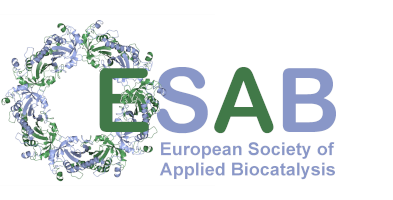Engineering protein catalysts for synthetic applications
Abstract
Chemical synthesis of small molecules can be profitably complemented by biocatalysis. This green technologyis used in countless applications from bench scale to industrial production and allows practitioners to access complex organic molecules, often with fewer synthetic steps and reduced waste[1]. Yet, before being applied, biocatalysts typically need to be optimized as most wildtype enzymes are just marginally stable in the selected reaction conditions and perform at scales well below what is required to drive an industrial process. Improved catalysts can be constructed in the laboratory by applying enzyme engineering strategies, among them the directed evolution of proteins. Accelerating implementation, advances in computational protein structure and property prediction are increasingly informing enzyme engineers[2]. By predicting how protein sequence encodes function, researchers aim to leverage the computational models to select a reduced number of optimized sequences for laboratory measurement with the aim to lower costs and shorten timelines of enzyme engineering campaigns[3-5]. In this presentation, an overview of the current status of biocatalysis will be complemented by successful engineering examples from our laboratory, including work carried out on Fe(II)/α-ketoglutarate dioxygenases[6], as well as on additional enzyme families of synthetic interest[7].
References:
[1] Rebecca Buller, Stefan Lutz, Romas J. Kazlauskas, Radka Snajdrova, Jeffrey C. Moore, Uwe T. Bornscheuer, From nature to industry: Harnessing enzymes for biocatalysis. Science 382, eadh8615 (2023). https://doi.org/10.1126/science.adh8615.
[2] Rebecca Buller, Jiri Damborsky, Donald Hilvert, Uwe T. Bornscheuer, Structure Prediction and Computational Protein Design for Efficient Biocatalysts and Bioactive Proteins. Angew. Chem. Int. Ed. Engl. 64, e202421686 (2025). https://doi.org/10.1002/anie.202421686.
[3] David Patsch, Michael Eichenberger, Moritz Voss, Uwe T. Bornscheuer, Rebecca M. Buller, LibGENiE – A bioinformatic pipeline for the design of information-enriched enzyme libraries. Comput. Struct. Biotechnol. J. 21, 4488-4496 (2023). https://doi.org/10.1016/j.csbj.2023.09.013.
[4] David Patsch, Rebecca Buller, Improving Enzyme Fitness with Machine Learning. Chimia 77, 116-121 (2023). https://doi.org/10.2533/chimia.2023.116.
[5] David Patsch, Thomas Schwander, Moritz Voss, Daniela Schaub, Sean Hüppi, Michael Eichenberger, Peter Stockinger, Lisa Schelbert, Sandro Giger, Francesca Peccati, Gonzalo Jiménez-Osés, Mojmír Mutný, Andreas Krause, Uwe T. Bornscheuer, Donald Hilvert, Rebecca M. Buller, Enriching productive mutational paths accelerates enzyme evolution. Nat. Chem. Biol. 20, 1662-1669 (2024). https://doi.org/10.1038/s41589-024-01712-3.
[6] Michael Eichenberger, Thomas Schwander, Sean Hüppi, Jan Kreuzer, Peer R. E. Mittl, Francesca Peccati, Gonzalo Jiménez-Osés, Michael Naesby, Rebecca M. Buller, The catalytic role of glutathione transferases in heterologous anthocyanin biosynthesis. Nat. Catal. 6, 927-938 (2023). https://doi.org/10.1038/s41929-023-01018-y.
[7] Sumire Honda Malca, Nadine Duss, Jasmin Meierhofer, David Patsch, Michael Niklaus, Stefanie Reiter, Steven Paul Hanlon, Dennis Wetzl, Bernd Kuhn, Hans Iding, Rebecca Buller, Effective engineering of a ketoreductase for the biocatalytic synthesis of an ipatasertib precursor. Commun Chem 7, 46 (2024). https://doi.org/10.1038/s42004-024-01130-5.
About the Speaker(s)
 Rebecca Buller is a biological chemist and Professor for Biotechnological Methods, Systems and Processes at the Zurich University of Applied Sciences. Rebecca Buller studied chemistry at the Westfälische-Wilhelms Universität Münster (D) and the University of California Santa Barbara (US). After completing her PhD with a focus on enzyme engineering at the ETH in Zurich (CH), Rebecca Buller accepted a position as laboratory head at the flavour and fragrance company Firmenich (CH). In 2015 she relocated to the Zurich University of Applied Sciences where she founded the Competence Center for Biocatalysis (CCBIO). Rebecca serves as an expert on numerous panels, among them the SCNAT Chemistry Platform, the working group Biotransformations of the DECHEMA, and she is founding board member of the Swiss Women in Chemistry. Rebecca and her group seek to expand the biocatalytic toolbox by sourcing and engineering enzymes for synthetic applications using chemical knowledge and bioinformatic tools. Their research program has been recognized with multiple awards, including the 2023 Roche Sustainability Award, the EFMC Prize for a Young Chemical Biologist and the Green & Sustainable Chemistry Award of the Swiss Chemical Society in 2024.
Rebecca Buller is a biological chemist and Professor for Biotechnological Methods, Systems and Processes at the Zurich University of Applied Sciences. Rebecca Buller studied chemistry at the Westfälische-Wilhelms Universität Münster (D) and the University of California Santa Barbara (US). After completing her PhD with a focus on enzyme engineering at the ETH in Zurich (CH), Rebecca Buller accepted a position as laboratory head at the flavour and fragrance company Firmenich (CH). In 2015 she relocated to the Zurich University of Applied Sciences where she founded the Competence Center for Biocatalysis (CCBIO). Rebecca serves as an expert on numerous panels, among them the SCNAT Chemistry Platform, the working group Biotransformations of the DECHEMA, and she is founding board member of the Swiss Women in Chemistry. Rebecca and her group seek to expand the biocatalytic toolbox by sourcing and engineering enzymes for synthetic applications using chemical knowledge and bioinformatic tools. Their research program has been recognized with multiple awards, including the 2023 Roche Sustainability Award, the EFMC Prize for a Young Chemical Biologist and the Green & Sustainable Chemistry Award of the Swiss Chemical Society in 2024.
